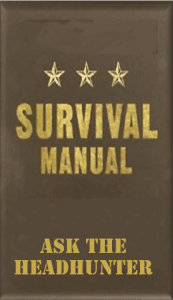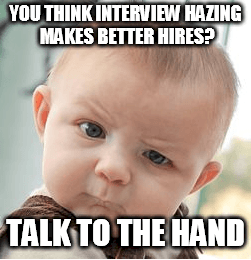In the March 15, 2016 Ask The Headhunter Newsletter, we do something completely different. We take a video approach to “the mountain” that stands between you and your next job.
Surviving the new economics of work
Microsoft recently asked me to talk for 20 minutes to thousands of IT (information technology) professionals whose jobs are at risk due to rapid changes in technology and in the economy. What can they do to save their careers? What kind of work should they do next?
Sound familiar?
I tuned my comments for Microsoft’s 3-day TechNet Virtual Conference (March 1-3, 2016) — but what I told the audience applies to any line of work, and it’s from the core Ask The Headhunter ideas we discuss here every week. This video includes about 20 minutes of me talking about the new economics of work, and 15 more of Q&A we did via Skype afterwards. A big thank-you to Microsoft and Channel9 for sharing this video with the Ask The Headhunter community.
Questions & Answers
This video raises in-your-face questions.
But I also show you how to answer them Yes! (I’ve added links to take you to more resources. Most of these are free, but there’s a link or two to my books.)
- Do you demonstrate breathtaking initiative to get a job?
- Are you accountable for how your work contributes to the bottom line?
- Do you hang out with people who do the work you want to do and talk shop? (Don’t be an icky networker!)
- Can you ride a fast learning curve without falling off?
- Do you understand the new economics of work — and can you show you’re the most profitable job candidate?
I talk about the #1 problem job seekers face: They let a mountain of obstacles interfere with their efforts to get a job.
- They try to beat the online job boards.
- They struggle to tunnel through Applicant Tracking Systems (ATSes).
- They play the keyword game with automated job application systems.
- They keep failing to reach the top of a mountain of competition.
In the video, I talk about why there is no mountain — no resume to write, no job postings to select or decipher, no job applications to file, no interviews to play to. I’m not kidding. I don’t think any of those “tools” help employers hire or job hunters get hired. I think our economy is bogged down by the detritus of phony, automated recruiting — it doesn’t work!
There’s just fearless job hunting.
- You become part of the circle of friends that naturally leads people to jobs — and that leads to hires.
- You show up with a clear definition of the problem or challenge that needs to be tackled.
- You deliver a viable business plan for the job.
- You show how you’ll do the work. And you create a new, profitable outcome the company never contemplated.
- You make yourself the job candidate who stands out from all the rest.
Does it matter what kind of work you do?
Virtually every kind of work today is under siege of one kind or another — but for the same reasons. Every industry, every company is increasingly focused on the bottom line. The shift that everyone faces is not just technological. It’s economic — and it’s about accountability. That’s what I talk about in the video. Economic pressures supersede all others — and technology jobs feel the pressure most because that’s where efficiencies that solve economic problems are supposed to come from. But no matter what kind of work you do, the shift must be in your own perspective.
Success is not about chasing hot jobs, because there’s really no such thing. (What’s hot changes by the time you catch it!) It’s about whether you are hot. What makes you hot? You have to make yourself and your work accountable. If you wait for the bean counters to do that, you’ll probably lose your job if you have one.
If you work in IT, the video will get you started on how to advance your career in the face of stunning shifts in technology — changes that probably put your current job at risk.
And if you don’t work in technology, you’ll quickly see how my suggestions will help your career in today’s turbulent economy. As I said, the 20 minutes of this video summarize many of the core ideas we talk about on Ask The Headhunter all the time. Of course, I couldn’t squeeze every Ask The Headhunter method, tip and lesson into a 20 minute video. For more about how to be a fearless job hunter who stands out from the competition by delivering profit, check out the Introduction to Fearless Job Hunting, which also details which of my books address which challenges.
I hope you enjoy the video, and that it inspires you to forget about mountains and obstacles while you plan how to deliver profitable work to a worthy employer — work that’s profitable to you, too.
Many thanks to my good buddies at Microsoft for the opportunity to get in front of the company’s enormous audience — and for their generous hospitality while I was in Seattle and on the Microsoft campuses in Redmond and Bellevue. Mostly, I’m grateful for the freedom to work unscripted — every word in the video is mine. No one told me what to say or what to talk about. (If you’re among the many Ask The Headhunter subscribers who work in IT, don’t miss the other great videos about the future of IT in the TechNet 2016 archive.)
Okay — let’s hear what you liked and didn’t like about what I said in the video. Then hit me with the in-your-face questions — what do you want to know more about? What would you like to see in future Ask The Headhunter videos — because I’m planning to make more. Let’s pound these topics!
: :

 Nick’s Reply
Nick’s Reply Today (March 1) we’re joined by some special guests! A big welcome to IT professionals from
Today (March 1) we’re joined by some special guests! A big welcome to IT professionals from 


 If I get this job — and even with help it’s still a big IF, — it will be my last job. The salary and perks will get me through my last 20 years before retirement, and a few years in, I can even move anywhere I like in the world and work remotely. Sweet.
If I get this job — and even with help it’s still a big IF, — it will be my last job. The salary and perks will get me through my last 20 years before retirement, and a few years in, I can even move anywhere I like in the world and work remotely. Sweet.

 I just sent one, after talking to the top dog. I repeated that I am interested in the position and told him of my immediate schedule. More importantly, and motivated by your columns, I told him about some activity of a standards committee that might have a strategic impact on his operations. I said I would be joining the committee, ex officio, by contributing some research I was doing, and I also told him what my input would be if I were working for him.
I just sent one, after talking to the top dog. I repeated that I am interested in the position and told him of my immediate schedule. More importantly, and motivated by your columns, I told him about some activity of a standards committee that might have a strategic impact on his operations. I said I would be joining the committee, ex officio, by contributing some research I was doing, and I also told him what my input would be if I were working for him.

 Question
Question What are your rules for working with headhunters? Have you been burned?
What are your rules for working with headhunters? Have you been burned?